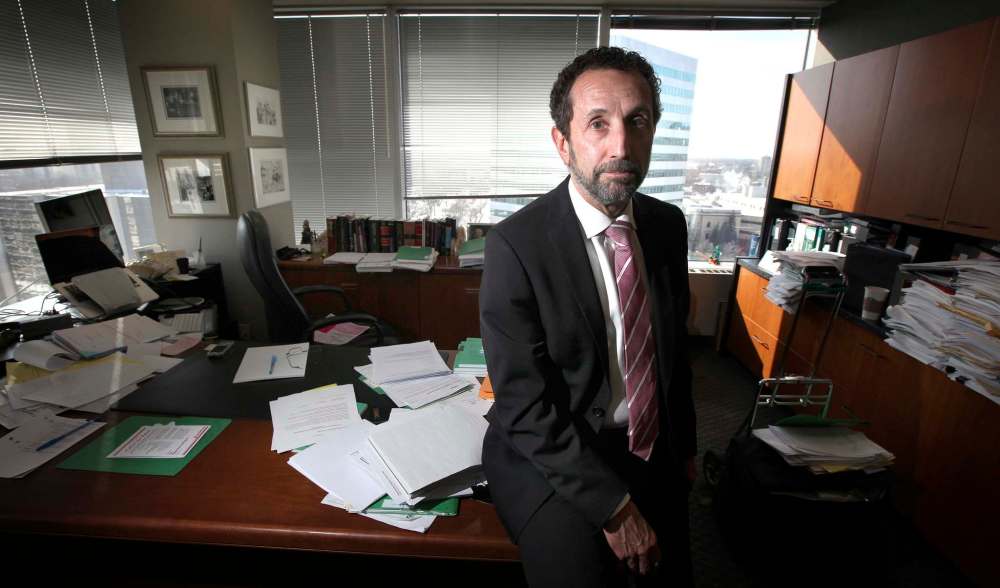Citing charter rights, Mark Grant’s lawyer asks judge to drop case
Advertisement
Read this article for free:
or
Already have an account? Log in here »
To continue reading, please subscribe:
Monthly Digital Subscription
$0 for the first 4 weeks*
- Enjoy unlimited reading on winnipegfreepress.com
- Read the E-Edition, our digital replica newspaper
- Access News Break, our award-winning app
- Play interactive puzzles
*No charge for 4 weeks then price increases to the regular rate of $19.00 plus GST every four weeks. Offer available to new and qualified returning subscribers only. Cancel any time.
Monthly Digital Subscription
$4.75/week*
- Enjoy unlimited reading on winnipegfreepress.com
- Read the E-Edition, our digital replica newspaper
- Access News Break, our award-winning app
- Play interactive puzzles
*Billed as $19 plus GST every four weeks. Cancel any time.
To continue reading, please subscribe:
Add Free Press access to your Brandon Sun subscription for only an additional
$1 for the first 4 weeks*
*Your next subscription payment will increase by $1.00 and you will be charged $16.99 plus GST for four weeks. After four weeks, your payment will increase to $23.99 plus GST every four weeks.
Read unlimited articles for free today:
or
Already have an account? Log in here »
Hey there, time traveller!
This article was published 27/02/2017 (3213 days ago), so information in it may no longer be current.
Defence lawyers for the man accused of killing 13-year-old Candace Derksen have asked a judge to drop the case against him, arguing his charter rights were violated by police reliance on DNA evidence experts have now said was flawed.
Mark Grant, 53, is standing trial for second-degree murder for the second time in Candace’s death. He was convicted in 2011, but that conviction was overturned on an appeal that included defence arguments that the DNA evidence linking him to the crime had been mishandled. Candace was found frozen to death in a lumberyard shed in January 1985, her hands and feet bound by twine that was key to the Winnipeg Police Service’s cold-case investigation into her death.
After six weeks of a retrial, Grant’s defence team introduced motions last Friday asking Court of Queen’s Bench Justice Karen Simonsen to enter a stay of proceedings in the case — which would drop the second-degree murder charge against Grant — or to exclude all of the nuclear DNA evidence that led to his arrest before making a decision on his guilt or innocence. They argue Grant was not able to fully defend himself against the second-degree murder accusation because all of the twine extract used for DNA testing was used up by the lab, Thunder-Bay-based Molecular World, during the 2007 investigation. That means it can’t be independently tested by defence experts, said defence lawyer Saul Simmonds, who argued his client was subjected to predjudice because the decision to arrest him was based on DNA results that can’t be replicated.

Justice Simonsen has reserved her decision on the defence’s applications.
Two internationally recognized geneticists who testified for the defence said they didn’t trust Molecular World’s results, describing them as “scientifically corrupt” and “fatally flawed.”
“The ability to reproduce a process of this kind of complexity where so much rides on it is so imperative to a scientist being able to do an evaluation — hence our problem with the whole process at Molecular World, because not only is that not done, but the court now has to have serious concern with respect to the reliability of virtually everything that took place,” Simmonds told the judge.
The Charter of Rights and Freedoms allows people to seek remedy from the courts if their rights have been infringed upon. That’s what defence lawyer Adam Hodge did when he asked the judge for a stay of proceedings in this case.
“This lab can’t produce consistent results and perhaps in the hands of a laboratory that can do that, we may have gotten more data that seems to exonerate Mr. Grant, which significantly impacts his right to make full answer and defence, and causes an extreme amount of predjudice,” Hodge said.
Crown attorney Brent Davidson argued against a stay of proceedings, saying the police acted reasonably in their investigation of the case and Grant’s charter rights hadn’t been violated. He said the defence should have asked to re-test the pieces of twine that had been entered into court as an exhibit.
“Candidly, the appropriate remedy? Order the twine tested. But what that means is that there’s no Section 7 (Charter) breach,” Davidson told court.
The trial has heard a liquid extract was produced from the twine to use in the DNA tests. That extract was used up after three nuclear DNA tests. The first two tests didn’t yield useable results, but the third test pointed to Grant, who was arrested the following month, in May 2007. Molecular World analysts also swabbed the actual twine, but doing so didn’t give them enough DNA to develop a DNA profile.
Simmonds described the Crown’s argument as “sleight of hand” and “smoke and mirrors.” He said the suggestion to order new tests on the twine “puts the onus on us in a way that is unacceptable.”
“The best evidence of whatever took place was in those extracts. And they had it, they misused it, they didn’t preserve it. The police didn’t preserve it, no one even addressed preserving it,” he said.
The judge is set to give her decision on the motions before the trial’s closing arguments that are scheduled to get underway in May.
katie.may@freepress.mb.ca
Twitter: @thatkatiemay

Katie May is a multimedia producer for the Free Press.
Our newsroom depends on a growing audience of readers to power our journalism. If you are not a paid reader, please consider becoming a subscriber.
Our newsroom depends on its audience of readers to power our journalism. Thank you for your support.




